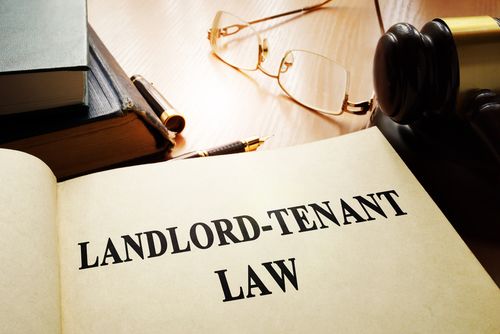The rental industry is governed by federal, state, and local landlord-tenant laws. Therefore, both tenants and landlords must understand their rights and responsibilities. Although tenants must hold up their end of the lease, landlords are held to a very high standard regarding habitability standards, building codes, and fair housing. Continue reading below as we examine the common landlord-tenant laws every property owner should know.
Federal Landlord-Tenant Laws
Landlord-tenant relationships can get complicated, and landlords have a lot of rules to follow. In general, these laws are meant to protect the health, safety, and rights of tenants. Although most laws occur at the state level, let’s look at the federal regulations that govern landlord actions.
The Fair Housing Act
Fair Housing Laws prohibit discrimination in various real estate transactions, including rentals. In addition, federal law states that landlords may not discriminate against any tenant based on the following seven protected classes – race, religion, color, national origin, sex, familial status, or disability.
Not only do these laws protect tenants in rental transactions, but they also impact how landlords market their property. For example, a property owner cannot advertise using language like “Small Studio Perfect for Single Student.” Even if the unit is relatively small, a statement like this could be viewed as discrimination based on familial status.
Furthermore, the law protects tenants against biased blanket statements such as – “Not accepting applicants with a criminal history.” In 2016, HUD added additional discrimination restrictions surrounding an applicant’s criminal history. They cited that property owners cannot unfairly discriminate against or refuse to accept an applicant based solely on their criminal record.
While federal Fair Housing Laws protect many renters already, state laws often go even further. Thus, landlords must check with their local jurisdiction for any additional protected classes such as the source of income, sexual orientation, gender identity, or ancestry.
Fair Credit Reporting Act
Most landlords verify credit history and creditworthiness as part of their application process. While this may be standard practice, the Fair Credit Reporting Act states that landlords must get permission before pulling an applicant’s credit report. Furthermore, per the FTC, if the landlord decides to deny an applicant based on credit; they must provide the following information to the tenant –
- Name, address, and phone number of the consumer reporting agency that generated the credit report
- A statement that the consumer reporting agency used did not make the denial decision and cannot provide further information or specific reasons for it.
- Inform the applicant of their right to dispute the report’s accuracy furnished by the consumer reporting agency. They may also request a free copy of the information from the company within 60 days.
- Provide a written adverse action letter that cites the decision to reject an application, requires a co-signer, or requires a higher security deposit and the reasons why.
State Level Landlord-Tenant Laws Every Landlord Should Know
Landlord-tenant laws can become far more involved at the state and local levels than previously discussed federal guidelines. That said, state law tends to focus on practical matters and tenant rights. For landlords, a thorough understanding of applicable laws is critical to your success. Therefore, helping to protect yourself, your business, and the property itself. So, although laws may vary from location to location, let’s review some of the most common landlord-tenant laws below.
- Discrimination and Fair Housing
- Standards of Habitability and Repairs
- Lease Documents
- Security Deposit Rules and Limits
- Required Disclosures
- Right to Quiet Enjoyment
- Abandoned Property
- Eviction Regulations
Discrimination and Fair Housing
As we mentioned above, landlords cannot discriminate against applicants based on a variety of protected classes. That said, state and local laws take that one step further, often adding additional provisions to protect applicants. However, the best thing landlords can do to avoid discrimination claims is to hold all applicants and tenants to the same standard. This includes consistent advertising, standardized qualifications, as well as fair policies and procedures.
 Standards of Habitability and Repairs
Standards of Habitability and Repairs
It should go without saying, but to offer a property for rent, landlords must adhere to specific habitability standards. This involves following all building codes and maintaining a safe and hazard-free home. In general, landlords are responsible for –
- Ensuring the property has working plumbing, heating, and fixtures
- Installing necessary emergency alert devices such as smoke and carbon monoxide detectors
- Maintaining provided appliances
- Treating for pest infestations (This is primarily the landlord’s responsibility in multi-family rentals. In single-family homes, the tenant is typically responsible for pest control.)
Another facet of maintaining habitability involves making timely repairs. While the tenant has a responsibility to report any maintenance concerns, the landlord is the one that must take quick and reasonable action. After all, failing to do so could give reasonable cause for a tenant to legally withhold rental payment if the landlord fails to make repairs that threaten the occupant’s health or safety.
A legal lease agreement is the backbone of the landlord-tenant relationship. These contracts outline each party’s roles, rights, and responsibilities, along with consequences for not following any terms. That said, the rental agreement must comply with all local, state, and federal laws. Often, states will dictate certain disclosures, security deposit limits, or special clauses that must be included.
Security Deposit Rules and Limits
The security deposit is a set payment collected from a tenant upfront and held in the event of tenant damage upon move out or to recover the landlord’s expense of an unexpected lease break. That said, state laws will dictate how much a landlord can charge for a deposit and the circumstances in which they can withhold it. In general, landlords must provide an itemized list of any deductions they make from the deposit and return the remaining funds to the tenant within a specified timeframe after move-out. That said, property owners may have between 15 to 60 days to return the deposit, depending on the property’s location.
 Required Disclosures
Required Disclosures
Depending on the location of a rental property, landlords may need to provide specific health or safety disclosures to their tenants. In general, these go hand in hand with the lease agreement and often involve signing an addendum to acknowledge receipt. That said, some of the most common disclosures include – the presence of mold, lead-based paint hazards, meth contamination, recent deaths, a notice of sex offenders, or other relevant safety hazards.
Right to Quiet Enjoyment
Landlord-tenant laws at the state level also protect a tenant’s right to quiet enjoyment. More commonly, this is known as tenant privacy and restricts what a landlord can do once the tenant has possession of the property. So, once the tenant signs a legal lease and moves in, the landlord cannot come and go as they please. Instead, landlords must only enter during a reasonable time of day and for a valid reason. In addition, the property owner must provide between 24 to 48 hours prior notice before stopping by.
 Abandoned Property
Abandoned Property
Unfortunately for landlords, sometimes tenants leave behind property after they vacate. Whether it is just trash, broken furniture, or personal belongings, it presents an issue. Depending on location, state law may direct landlords to remove and store property as well as make a concerted effort to contact and return it to the tenant. In some cases, landlords may dispose of belongings with a value under the state threshold. That said, landlords must refer to their state-specific regulations regarding abandoned tenant property.
Eviction Regulations
Eviction is something no landlord ever wants to go through; however, it is necessary for some instances. That said, a lawful eviction requires a court process, and landlords must never try to remove a tenant through threats, intimidation, cutting off utilities, or physical force. While every state has different guidelines, eviction typically begins with issuing notice to the tenant. Depending on the type of notice, there may be specific time requirements, for example, anywhere from 3 to 30 days. From there, landlords must file in court to regain possession of their property. That said, the legal reasons to pursue an eviction include –
- Non-payment of rent
- Holding over past the agreed upon lease term
- Breaching any provision of the lease agreement
- The property owner is selling the home
- To complete renovations to the property
- Tenants cause damage to the property
The COVID pandemic created many changes for the rental industry, including a halt on non-payment evictions. However, those protections expired throughout most of the country, and courts have begun hearing cases. Landlords and tenants are encouraged to work together to reach a resolution that aims to avoid unnecessary evictions.
Worry-Free Legal Compliance for Landlords
Whether federal, state, or local landlord-tenant laws, it can be challenging for property owners to keep up. Especially now, the COVID pandemic has brought into sharp focus just how quickly regulations can change regarding evictions or other matters. Moreover, ignorance is not a viable defense for not knowing the law, however complicated it may be.
That said, hiring a professional property management company provides owners peace of mind that all daily operations are taken care of, including staying legally compliant. At Bay Property Management Group, our team of highly trained staff remains current on changing legal matters that impact our clients and the rental industry. So, if you would like to know how owning a rental property can be both profitable and less stressful – give us a call today.














